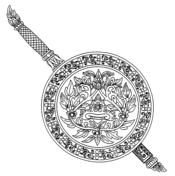Royal Thai Police
| ตำรวจแห่งชาติ | |

Official Seal
|
|
 Coat of Arms (cap badge) |
|
| Agency overview | |
|---|---|
| Formed | 1933 |
| Jurisdiction | National |
| Headquarters | Bangkok |
| Employees | 210,700 |
| Annual budget | 62,510,611,700 baht (2008) |
| Agency executives |
|
| Website | Royal Thai Police |
The Royal Thai Police (RTP) (Thai: ตำรวจแห่งชาติ) are the national police force of Thailand. The RTP employs between 210,700 and 230,000 officers, roughly 17 percent of all civil servants (excluding military and the employees of state-owned enterprises). Sometimes The Royal Thai Police is recognized as the fourth armed force of Thailand as their tradition, concept, culture, skill and training are relatively same as the army and most of their officer cadets need to graduate from the Armed Forces Academies Preparatory School together with prospective cadets of the armed forces branches as a preparatory requirement before entering the Police Academy.
Until the 19th century Royal Thai Armed Forces personnel, aside from their duties of national defence, also performed law enforcement duties alongside dedicated civil servants. Responsibility for law and order was divided into the 6 ministries led by chancellors of state (during the Ayutthaya and Thonburi eras), during wartime police units were under royal command as part of the army. Only during the reigns of King Mongkut (Rama IV) and King Chulalongkorn (Rama V) the nation saw a huge reform and the Westernization of Thai law enforcement forces to adapt to the changing situation and needs of the country. By 1902 the Royal Thai Police Academy was founded to train future police officers. In 1915 the provincial and urban police forces were united as one national organization under the Ministry of Interior (established 1894).
Primary responsibility for the maintenance of public order through enforcement of the kingdom's laws was exercised by the Thailand National Police Department (TNPD), a subdivision of the Ministry of Interior. Charged with performing police functions throughout the entire country, the TNPD was a unitary agency whose power and influence in Thai national life had at times rivalled that of the armed forces itself.
The formal functions of the TNPD included more than the enforcement of laws and apprehension of offenders. The department also played an important role in the government's efforts to suppress the remnants of the communist insurgency. In the event of an invasion by external forces, much of the police force would come under the control of the Ministry of Defense to serve with, but not be incorporated into, the military forces.
...
Wikipedia
